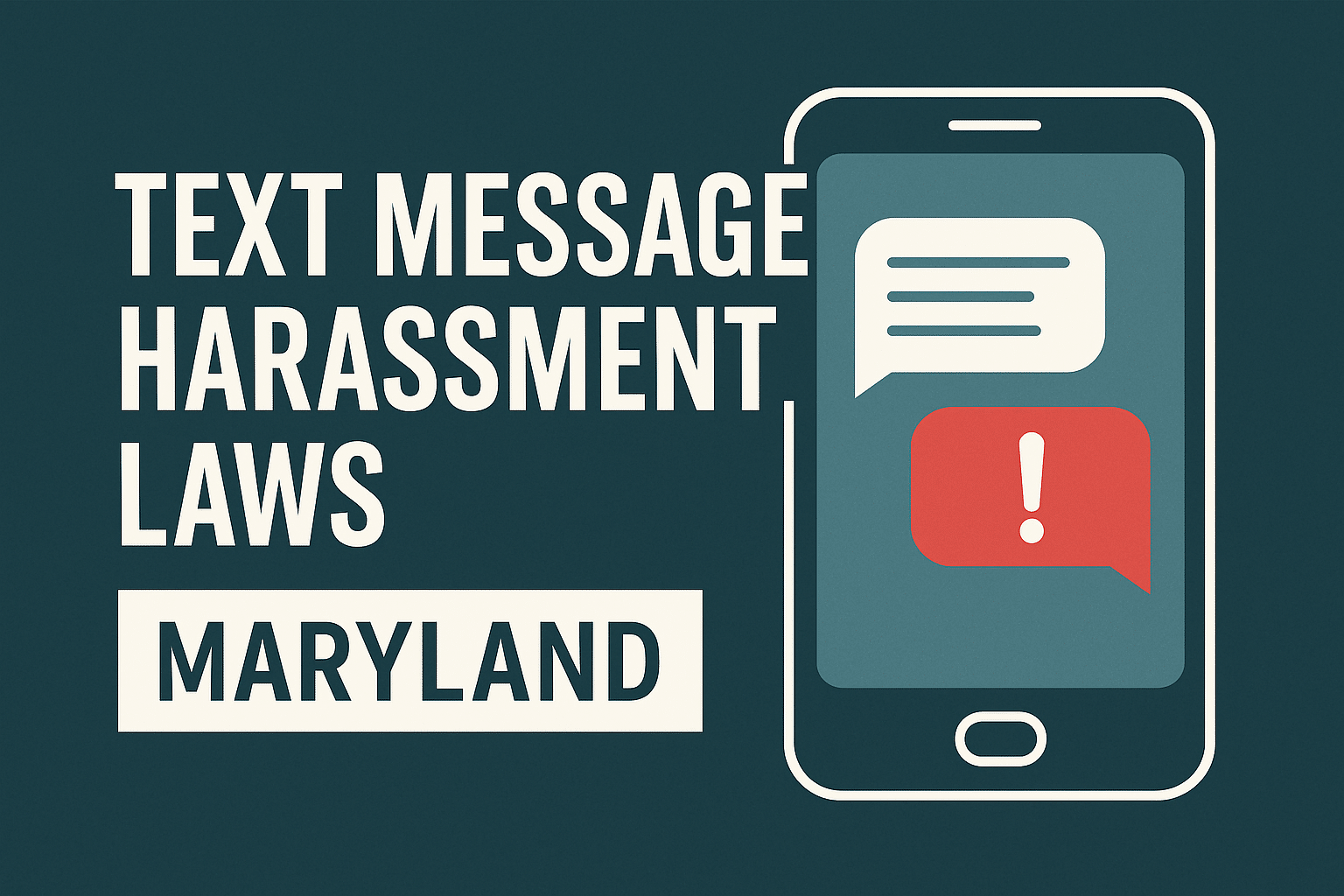
Harassment no longer happens just in person — it often occurs through text messages, social media, and other digital communication. Text message harassment laws in Maryland make it a crime to repeatedly send threatening, obscene, or harassing messages intended to alarm or annoy another person. Both criminal charges and protective orders can apply, depending on the circumstances.
Key Maryland Laws on Text Message Harassment
Several Maryland statutes cover harassment and electronic communication. The most important include:
- Harassment (§ 3-803) – It is illegal to follow or contact someone repeatedly with the intent to alarm or seriously annoy them, after being told to stop, and without a legitimate purpose.
- Misuse of Telephone Facilities (§ 3-804) – Using a phone, including a cell phone, to make anonymous or repeated calls intended to abuse, threaten, or harass someone can lead to criminal charges.
- Misuse of Electronic Communication (§ 3-805) – This law specifically covers electronic messages, including texts, emails, and social media. Sending repeated or malicious messages that harass or alarm another person violates this statute.
- Stalking (§ 3-802) – Repeated unwanted contact or messaging that causes fear of bodily harm or serious emotional distress can be charged as stalking.
- Threats of Mass Violence (§ 3-1001) – If a text message includes threats of mass harm, it can lead to felony charges with severe penalties.
What Counts as Text Message Harassment
To qualify as harassment under Maryland law, the prosecution generally must show that the messages:
- Formed a course of conduct — repeated or ongoing contact, not a one-time message.
- Were sent maliciously, intending to harass, alarm, or annoy.
- Continued after a clear request to stop or warning from the recipient.
- Had no legitimate purpose, such as work or legal communication.
- Seriously alarmed or distressed a reasonable person in that situation.
Even if the sender did not intend to cause emotional distress, the repeated nature and content of the messages can still lead to charges.
Penalties for Text Message Harassment in Maryland
Harassment and electronic communication offenses are usually charged as misdemeanors, but they can still carry serious consequences:
- Harassment (§ 3-803): Up to 90 days in jail and a $500 fine for a first offense.
- Repeat offenses: Up to 180 days and a $1,000 fine.
- Misuse of Telephone or Electronic Communication: Up to one year in jail and fines.
- Stalking: Up to five years in prison and a $5,000 fine.
- Threats of Mass Violence: Felony penalties up to 10 years in prison and $10,000 in fines.
In addition to jail or fines, a conviction creates a permanent criminal record that can affect employment, housing, and licensing.
Common Defenses to Harassment Charges
There are several possible defenses to a harassment or electronic communication charge:
- Free speech: Communications made to express lawful opinions or political beliefs are protected.
- No malicious intent: The defendant did not intend to harass or alarm.
- Isolated message: A single text message, without repetition, may not qualify as a “course of conduct.”
- No warning given: The sender was never asked to stop messaging.
- Legitimate purpose: The messages related to a lawful purpose, such as collecting a debt or arranging custody.
Each case depends on its facts — including the relationship between the parties, the message content, and whether warnings were given.
What To Do If You’re Being Harassed by Text Message
If you’re being harassed by text messages, take these steps right away:
- Save the messages. Do not delete them. Take screenshots and note the dates and times.
- Tell the sender to stop. Send a clear message stating that you do not want further contact.
- Do not engage. Avoid replying or escalating the situation.
- Contact local law enforcement. File a report and provide copies of all messages.
- Seek a protective order. If the harassment involves threats or comes from someone you know personally, you may be eligible for a peace or protective order.
- Consult a criminal defense attorney. Whether you are the victim or accused, a lawyer can help you understand your rights and the next steps.
These laws apply throughout Maryland, including Prince George’s, Charles, Calvert, and St. Mary’s Counties. Local police and State’s Attorney’s offices take electronic harassment seriously, especially when threats or repeated messages are involved.
Printable Checklist: What to Do if You’re Being Harassed by Text
You can print this checklist and keep it for reference.
☑ Save all messages – Screenshot or back up texts and call logs.
☑ Do not respond – Avoid giving the sender more material to use.
☑ Send one clear message – “Do not contact me again.”
☑ Record the date/time – Document when the harassment occurs.
☑ Tell someone you trust – Friends or family can help track patterns.
☑ Contact police if it continues – Provide evidence and your written request to stop.
☑ Ask about protective orders – Peace or protective orders can prohibit contact.
☑ Speak to an attorney – A Maryland criminal lawyer can explain your legal options.
Final Thoughts
Harassment by text message can be frightening and invasive. Maryland law provides clear protections against this behavior and penalties for those who cross the line. If you are being harassed — or accused of harassment — understanding these laws is the first step to protecting your rights.
